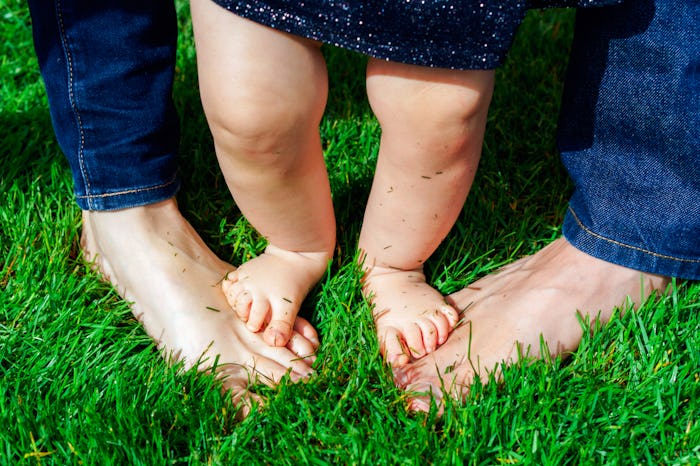Baby

Seriously, Why Do Babies Hate Grass So Much?
They don’t really hate it, but they absolutely will lift their feet up in protest.
You’ve probably seen more than one viral video of a baby trying their hardest to avoid their toes touching the grass as their parents cautiously lower them toward a lush patch of greenery. That thing they do when they lift their feet up is so adorable, but why do babies hate grass? Do they actually loathe a fresh-cut lawn or is there something more going on?
Why Does It Seem Like Babies Don’t Like Grass?
“Some babies lift their feet out in the air when a parent attempts to put them down on the grass because as a baby’s nervous system develops, sights, sensations, and sounds are intense,” neuropsychologist Dr. Sanam Hafeez tells Romper. “The ticklish, sharp blades of grass can catch a baby off guard, and some babies are often scared of it, as they are used to softer, more comfortable surfaces such as wood, tile, or carpet.”
So, it isn’t actually that your baby hates the grass, but rather it’s a new, unfamiliar experience for them. (Still, the videos of this are hilarious.) “In other words,” Hafeez says, “grass can cause some babies to experience a sensory overload.”
But, it doesn’t happen to all babies. “Some babies react differently to sensory experiences than others, which is why some babies lift their legs and others do not,” Hafeez explains.
Should Your Baby’s Dislike Of Grass Be Cause For Concern?
A pediatrician at Children’s National Hospital, Dr. Sarah Schaffer-DeRoo offers parents yet another explanation for babies who avoid grass. “This may be related to the temperature or texture of the surface, and possibly around caregivers’ own apprehension around a new experience or sensation,” she tells Romper.
So, if you’re relaxed around grass and encouraging of this new experience, chances are your baby might be a bit more open to touching it. But, should you be concerned if your baby just outright refuses to let you put them down on your lawn? According to the experts, this isn’t actually a huge deal.
“I would not worry about an infant that is hesitant to place his/her feet on the grass unless the infant is unwilling to bear weight on any surface,” Schaffer-DeRoo explains.
Does A Baby Hating Grass Have Anything To Do With Sensory Processing?
Touching grass or other textured surfaces may cause sensory overload for a baby, which could lead parents to wonder if their baby will have difficulty processing different sensations as they grow.
“Sensory processing disorder is a condition in which the brain has trouble responding and receiving information that comes in through the senses,” Hafeez tells Romper. “It’s very difficult to say at such a young age if a baby with sensory issues needs a diagnosis or if they will continue to avoid certain textures. The sensory system develops throughout the first year of life, and there are therapeutic activities you can do to improve the way a baby's sensory system works.”
It’s promising news that there is currently no scientific literature to support a connection between sensory processing disorder and babies who dislike grass. Similarly, experts say that most babies will become more open to experiencing different and new textures once they reach their first birthday.
“As children grow, observe, and share experiences with their caregivers and peers, they are more likely to explore new textures,” Schaffer-DeRoo tells Romper. “It is for this reason that we recommend continuing to offer foods that a child has previously rejected so that they can continue to shape their tastes and preferences.”
The same can be said for touching grass — if your baby hates it today, don’t worry. When you try again later, they may actually prefer it to your itchy shag carpet or the cold tile floor. (Just be sure to keep your camera handy in case they do that adorable leg lift thing again.)
Experts:
Dr. Sanam Hafeez, neuropsychologist in NYC and Columbia University faculty member
Dr. Sarah Schaffer-DeRoo, pediatrician at Children's Nations Hospital
This article was originally published on